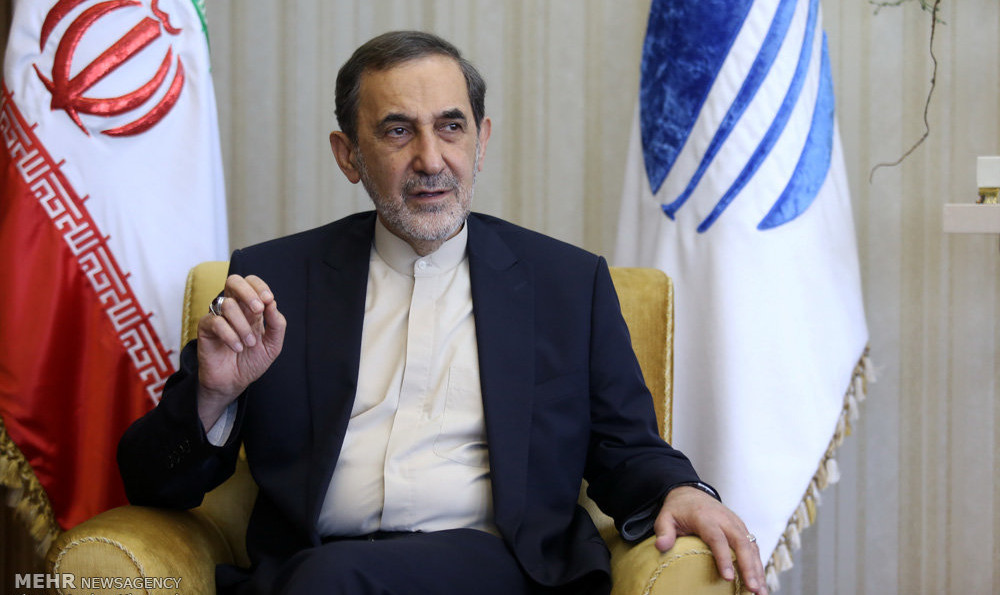PHOTO: Supreme Leader’s top aide Velayati “Without Assad’s government, the resistance against Israel and its supporters will be weakened”
Ali Akbar Velayati, the senior aide to Iran’s Supreme Leader, is the lead official for support Syria’s Assad regime.
Velayati has repeatedly said since last November — as Iran and Russia coordinated the aerial and ground intervention to save the Syrian regime and military — that Assad’s future is a “red line” for Tehran. On Sunday, he insisted that, despite a series of defeats for Iranian-led forces near Aleppo, “the tide has turned” in favor of Assad in Syria’s conflict.
Iran Daily: “Tide Turning in Favor of Syria’s Assad”
On Tuesday, the Tehran Times published an interview in which Velayati expanded on Iran’s unflinching support for the Assad regime.
Why does Iran support Syria?
Because we have had very strong and intimate relations with Syria since the beginning of the Revolution [in 1979]. Particularly, bilateral ties were strongest when Iran was involved in the war with Iraq. At that time, the Syrian government helped us a lot, cutting the oil pipeline which was carrying one million barrels per day of Iraq’s oil to Syria and the Mediterranean Sea at Hafiz Assad’s order. This resulted in resulting in a great economic pressure on Iraq.
Internationally, Syria has always been supporting Iran. Through Syria, we provide help to Hezbollah and the Palestinians as two important elements of resistance against the Israel regime. And now, President Assad and the government and people of Syria are the golden ring of the resistance chain in the region. So, without the Syrian government, this chain will break and the resistance against Israel and its supporters will be weakened. So, because of this long history of bilateral relations, regionally and internationally, we have to help the Syrian government.
Under what conditions, Iran will be ready to agree on a solution for the Syrian crisis?
First of all, we strongly believe that the Syrian government is the legal and legitimate government of the country which is recognized by the United Nations and its flag is there. Its representative Bashar Ja’afari is there. So, on the one hand, we have the legal government of a country and on the other, there are opposition groups. Groups such as Al-Nusra and Daesh which the UN has designated as terrorist groups. These groups must not be allowed to participate in the negotiations.
And there are also other preconditions. One is to preserve territorial integrity of Syria. Any sort of decision like what the US Secretary of State John Kerry announced two months ago that the alternative B plan is Syria being disintegrated is not accepted. This is not the duty of the US administration to decide whether Syria should disintegrate. So, one of our most important precondition is to maintain the Syrian geography as it is now. And of course, under the supervision of the United Nations, these peace negotiations should continue.
As far as Iran is concerned, President Assad was elected by the people of Syria more than two years ago. He should continue his presidency up to end of the normal term which is seven years. And after that, like any other Syrian he can participate in future presidential elections. Nobody can deprive him of the right.
What do you think is the root cause of the Syrian crisis? Some believe if President Assad had listened to Syrians’ grievances in 2011, the current situation wouldn’t have occurred. On the other hand, there are others who see foreign intervention in Syria as the main cause. What is your assessment?
Who has given the right to the U.S. to decide upon the destiny of Syrians just because they feel the Syrian people don’t want Assad to remain in power? Who said Bashar doesn’t care about his people? What about other countries in the region? Have Saudis, for example, held a referendum in Saudi Arabia to see if their people are satisfied with the ruling system?
So, we do believe they want to eliminate President Assad because he is a real patriot with strong patriotic feelings. Besides, he is very resistant to Israel and its supporters. Moreover, Syria has a very important strategic position in the Middle East.
Before the disastrous fighting, Saudi Arabia, Turkey, and Qatar did their best to draw the attention of Bashar Assad away from Iran. However, they failed in their attempts. The only condition under which Saudi Arabia is ready to put aside hostility toward Bashar Assad is when Bashar cuts friendly relations with Iran. That is why these three countries started to fight the legitimate government of Syria. This is my belief that if one day President Assad bows down to their ambitions, fighting and blood shedding will stop. But he wants to remain resistant and part of the resistance chain against Israel.
So the main reason why they decided to attack Syria was to defeat the resistance in Syria and the region. We do believe Saudis are looking for domination in the region, including domination over Yemen, Syria, Iraq, and Lebanon. This is while Iran is the main friend of these countries and, based on the formal invitation of these countries, Iran has sent military advisors to Syria and Iraq.

